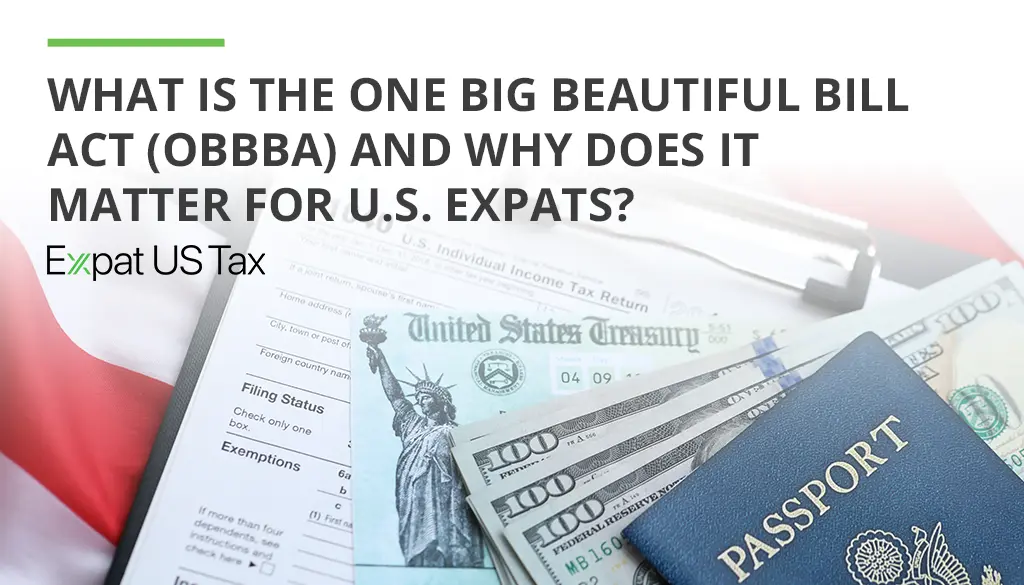What is the One Big Beautiful Bill Act (OBBBA)


Aya Takriti, an IRS Enrolled Agent with 11 years of expat tax experience, specializes in US tax preparation, tax planning and tax advice for US citizens and Green Card holders living and working in the Middle East. *Schedule a consultation with Aya today.
*30-minutes US$247.
Table of Contents
What is the One Big Beautiful Bill Act (OBBBA) and why does it matter for US expats?
The One Big Beautiful Bill Act (OBBBA) was signed into law on July 4, 2025. Its purpose is to reduce federal income taxes for certain groups, including employees who earn tips, workers paid overtime, and seniors receiving Social Security.
For Americans living abroad, the Act matters because it touches several credits and deductions that appear on US tax returns, even if much of your income is earned overseas. Some provisions apply through 2028, while others are permanent.
When did the OBBBA take effect, and which tax years does it cover?
The law applies retroactively to January 1, 2025. This means you will first see its effects when filing your 2025 return in 2026.
Several provisions, such as the US$6,000 senior deduction, the exemption for tips and overtime, and the expanded Child Tax Credit, will automatically expire after 2028 unless Congress decides to extend them.
What are the main tax changes introduced by the OBBBA?
The Act includes a wide range of tax updates. Here are the most notable ones:
- Tips and overtime pay are tax-free at the federal level: US-based employees in service or hourly jobs will benefit most.
- Seniors receive a US$6,000 additional deduction: This comes on top of the existing senior standard deduction, which may eliminate tax on many Social Security benefits.
- Child Tax Credit increases to US$2,200 per child for 2025: Only one parent must have an SSN, but each child must still have a valid SSN. ITINs no longer qualify.
- SALT (state and local tax) deduction cap increases: Higher-income taxpayers who still file state returns may deduct more than under previous rules.
- Small business incentives expand: The Section 199A deduction increases from 20% to 23%, and 100% bonus depreciation is restored for investments.
Some of these provisions provide broad tax relief, while others are targeted to specific groups.

Get personalized tax advice from a seasoned expert today.
How does the OBBBA affect Americans abroad?
While the Act delivers major tax relief to US-based workers and seniors, expats experience more modest changes:
- Foreign Tax Credit (FTC) remains unchanged: This is significant because early drafts of the law included Section 899, which would have reduced the value of the FTC. Its removal means expats can still use foreign taxes paid to offset US liability.
- Child Tax Credit (CTC) rises to US$2,200 per child: Although not as high as first proposed (US$2,500), it still provides additional relief to families abroad with eligible children.
- Foreign gift and inheritance reporting thresholds stay the same: The limit for Form 3520 remains at US$100,000 for gifts from foreign individuals. Predictions of a lower threshold have not been confirmed.
- FBAR and FATCA thresholds are unchanged. The FBAR filing requirement remains at US$10,000, while FATCA/Form 8938 thresholds stay at US$200,000 (single abroad) or US$400,000 (married abroad). Penalties remain severe for noncompliance, though the Act itself did not increase them.
What happened to Section 899 and why was it removed?
Section 899 was one of the most controversial proposals in early versions of the bill. It would have raised US tax rates on Americans living in countries with digital services taxes, such as the UK, France, Canada, Spain, and Australia.
Before the Act was finalized, the US government reached an agreement with the G7 countries to address these tax conflicts. As a result, Section 899 was eliminated from the law. For expats in those jurisdictions, this avoided what could have been a significant increase in US tax liability.
What are the potential downsides of the OBBBA for US expats?
Expats do not face new reporting thresholds under the Act, but there are still limitations:
- Most new deductions are US-centric: The tax-free treatment of tips and overtime does not extend to most foreign employment arrangements.
- Key provisions expire in 2028: Planning around these sunset dates will be important, particularly for families relying on the Child Tax Credit.
- Foreign gift reporting rules remain complex: Although the US$100,000 threshold is unchanged, Form 3520 filing requirements and penalties are still a compliance challenge for many.
- No progress on citizenship-based taxation: The Act did not move toward residence-based taxation, leaving expats to continue managing US tax alongside their local obligations.
What practical steps should US expats take now in response to the OBBBA?
Here is a short checklist:
- Compare credits carefully: Evaluate whether the FEIE or FTC produces the best outcome, especially with the Child Tax Credit now larger.
- Stay alert to IRS guidance: The IRS is releasing new forms and instructions for claiming deductions on tips and overtime; expats should confirm whether these apply in their situation.
- Plan for 2028: Consider what will happen if the senior deduction, tip/overtime exemption, and CTC expansion all expire.
- Monitor gift reporting rules: The threshold remains US$100,000, but expats should keep an eye on possible updates.
- Work with a tax professional: The law is new, and specialist support helps ensure accurate filing across both U.S. and foreign systems.
FAQ'S
Can US expats claim the OBBBA exemption for tips and overtime earned abroad?
Not usually. If you work for a foreign employer and are paid under local payroll systems, your tips or overtime will not qualify for the new deduction. If you are covered by the Foreign Earned Income Exclusion (FEIE), you also cannot apply both the exclusion and the OBBBA deduction to the same income.
Does the Child Tax Credit apply if my child has an ITIN?
Does the OBBBA change the Foreign Earned Income Exclusion (FEIE)?
Are FBAR and FATCA thresholds different under this law?
Will these provisions expire after 2028?




